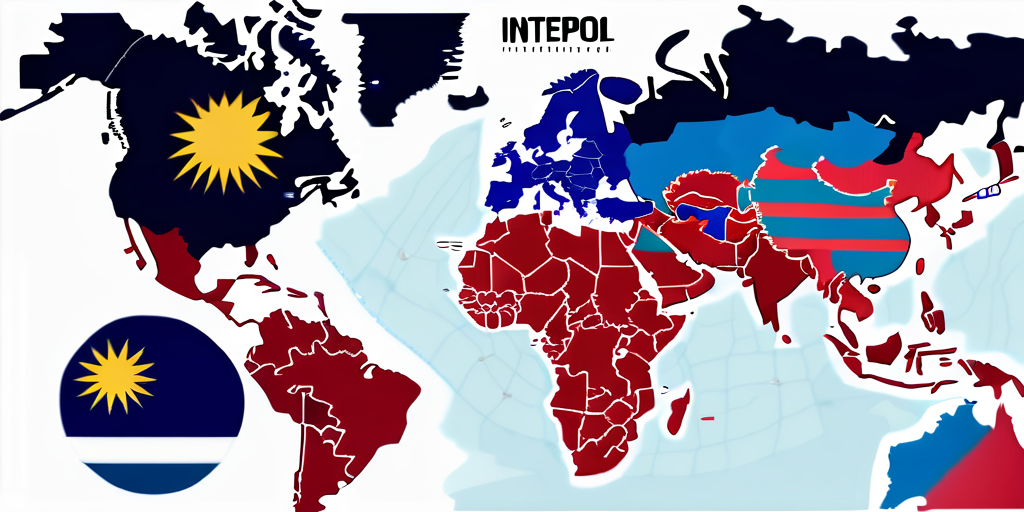Interpol, the International Criminal Police Organization, plays a crucial role in international law enforcement. One of its key tools in seeking justice and maintaining global security is the Red Notice. This article aims to provide an in-depth understanding of Malaysia’s engagement with Interpol and the implications of a Red Notice for the country. Furthermore, it will address the criticisms surrounding the use of Red Notices and shed light on the future of Interpol and Malaysia’s role within the organization.
Understanding the Interpol Red Notice
The Red Notice is a powerful mechanism used by Interpol to seek the location and arrest of individuals wanted for extradition or prosecution. It acts as an international alert system, enabling law enforcement agencies worldwide to share vital information about fugitives. Malaysia’s experience with Red Notices has been both advantageous and challenging, demonstrating the complex nature of international law enforcement cooperation.
Definition and Purpose of Red Notice
A Red Notice is essentially a request to locate and provisionally arrest an individual pending extradition. It serves as an international wanted notice, providing information on the alleged offenses and the individual’s identity. Its primary objective is to facilitate cooperation among countries in apprehending fugitives and ensuring their surrender to the requesting state.
Interpol’s Red Notices are not arrest warrants; they are, instead, authoritative notifications to law enforcement agencies worldwide. Each member country decides whether to consider the notice as a valid basis for arrest and subsequent extradition proceedings.
The Process of Issuing a Red Notice
The process of issuing a Red Notice involves a comprehensive evaluation by Interpol’s General Secretariat. To initiate a Red Notice, a member country must submit a request detailing the legal basis for the arrest, relevant evidence, and supporting documentation. Interpol’s General Secretariat then reviews the request, ensuring compliance with its Constitution and Rules.
Upon approval, the Red Notice is circulated to all Interpol member countries. However, each country reserves the right to assess the notice’s validity based on their national legislation and legal framework.
Malaysia’s Engagement with Interpol
Malaysia has been an active member of Interpol since [insert date]. Its involvement in the organization has been instrumental in combating transnational crime and addressing global security challenges.

History of Malaysia’s Interpol Membership
Malaysia’s partnership with Interpol dates back to [insert year], when it joined as a member state. Over the years, Malaysia has actively participated in various Interpol initiatives, fostering cooperation among law enforcement agencies worldwide.
Malaysia’s Role and Responsibilities in Interpol
As a member country, Malaysia has shouldered responsibilities in line with Interpol’s mission and objectives. It has collaborated with other member countries in combating terrorism, organized crime, drug trafficking, and cybercrime, among other transborder offenses.
Malaysia has also contributed to the organization’s databases, providing valuable intelligence and information to support international investigations. Its commitment to sharing resources and expertise has further enhanced its standing as an essential player within Interpol.
The Implications of a Red Notice for Malaysia
When Malaysia receives a Red Notice, it triggers a series of legal and diplomatic implications. Understanding these implications is crucial in comprehending the challenges and opportunities that arise for the country.
Legal Consequences for the Accused
For individuals subject to a Red Notice, the legal consequences can be severe. If arrested, they may face extradition proceedings and potential prosecution in the requesting country. Malaysia, as the requested state, must carefully evaluate the notice’s merits and adhere to its national legislation while handling extradition requests.
Due process, fair trial guarantees, and respect for human rights remain paramount throughout the proceedings. Any decision to extradite should take into account the evidence presented, ensuring that adequate safeguards are in place.
Impact on Malaysia’s International Relations
The issuance of a Red Notice for an individual in Malaysia can have repercussions on the country’s international relations. As it involves high-profile cases, such notices may attract media attention and scrutiny from various stakeholders.
It is crucial for Malaysia to handle such cases diplomatically and transparently. Engaging in constructive dialogue with the requesting country can help build confidence and maintain the nation’s reputation as a responsible member of the global community.
Criticisms and Controversies Surrounding Interpol Red Notices
While Interpol’s Red Notices serve as an essential tool in international law enforcement, they are not immune to criticism and controversy.

Misuse of Red Notices for Political Purposes
One of the main concerns surrounding Red Notices is their potential misuse for political purposes. In some instances, governments have been accused of abusing the system to persecute political opponents or stifle dissent. This practice undermines the integrity of Interpol and raises questions about the fairness and impartiality of Red Notices.
Human Rights Concerns
The pursuit of justice must always be conducted with a respect for human rights. While Interpol has made efforts to mitigate the risk of human rights abuses associated with Red Notices, concerns still arise. The potential for wrongful arrests, lack of due process, and political interference in the extradition process demands ongoing scrutiny and reforms.
Future of Interpol and Malaysia’s Role
Recognizing the need for continuous improvement, Interpol and its member countries are exploring ways to strengthen the Red Notice system and address the challenges it poses. Malaysia, as a vital member state, can play a pivotal role in shaping the future of the organization.

Proposed Reforms for the Red Notice System
Efforts are underway to enhance the fairness, transparency, and accountability of Interpol’s Red Notice system. Proposals include establishing stricter criteria for the issuance of notices, conducting thorough evaluations of requests, and providing more opportunities for individuals to challenge the notices.
Strengthening Malaysia’s Position in Interpol
Malaysia has the potential to further strengthen its position within Interpol by actively participating in discussions, sharing experiences, and advocating for reforms. It can contribute to shaping the organization’s policies and procedures, ensuring they align with international standards and respect for human rights.
In conclusion, Malaysia’s engagement with Interpol and its experiences with Red Notices highlight the complexities of international law enforcement cooperation. The implications of a Red Notice extend beyond legal consequences, impacting Malaysia’s international relations. While criticisms surrounding the use of Red Notices persist, efforts are underway to reform and improve the system. Malaysia, as a committed member state, has the opportunity to contribute to these reforms and shape Interpol’s future, ensuring justice is served while upholding human rights and fair trial guarantees.
